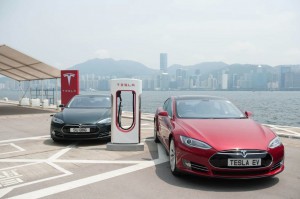
The smog the covers Beijing and other large cities in China now has regulators examining a plan to eliminate vehicles powered by internal combustion engines.
With numerous cities already taking steps to limit the sale of vehicles powered by internal combustion engines, Chinese regulators are looking at options for a total ban, according to the Xinhua news agency.
Struggling to address endemic air pollution problems plaguing many of its cities, China has already set a target of having 20% of its new models powered by plug-in hybrid or pure battery-electric powertrains by 2025 – though industry officials have been pressing the government to roll back that mandate.
The Asian nation, which is the world’s largest automotive market, is just one on a growing list of countries considering such a ban.
Norway and India already have enacted mandates calling for a complete switch to zero-emissions vehicles during the coming decade, and France and the UK have signaled similar plans are in the works. Even Germany, home to the Autobahn – and some of the world’s largest automakers – may enact a ban, Chancellor Angela Merkel recently suggested.
Noting “some countries have made a timeline for when to stop the production and sales of traditional fuel cars, Xin Goblin, China’s vice minister of Industry and Information Technology, said “The ministry has also started relevant research and will make such a timeline with relevant departments.”
Such a plan, he added, would “certainly bring profound changes for our car industry’s development.”
With some of the world’s worst urban air pollution, some observers had felt it was only a matter of time until China would make such a move. More than a dozen cities, including sprawling Beijing and Shanghai, have already taken steps to encourage sales of electrified vehicles. They currently limit the number of conventionally powered vehicles that can be registered each month, though those restrictions are waived for qualified alternative-powered models.
(Automakers plead with China to delay EV mandates. For the story, Click Here.)
On a national level, China has already laid out plans to have at least 20% of all new models using plug-in or pure battery-electric drivelines by 2025. That has provoked a strong pushback from the auto industry, but Xin’s comments suggest that, if anything, Beijing’s communist leaders are now determined to go even further towards a zero-emissions future.
The move is generating some controversy. For one thing, Chinese consumers have been slower to adapt plug-based vehicles than regulators had hoped, even with the restrictions already in place.
That said, China is now the world’s largest market for electrified vehicles, sales of conventional hybrids, plug-ins and pure battery-electric models last year totaling 336,000. That was up 50% over 2015 and more than double the 159,620 battery-based products sold in the U.S.

Jin Zheyong, left, and Peter Fleet are all smiles after signing a deal to jointly develop, produce, sell and service EVs in China.
And not everyone is convinced such a move would resolve the air pollution problems fouling many of China’s cities because of the country’s dependence upon coal-fired generators for much of its electricity. But many of those are now being replaced by cleaner energy sources.
But few expect the Chinese government to back down beyond possibly slowing the timing of the push to electrification. And that’s leading a number of foreign manufacturers to announce new production plans. Both Ford and Mercedes-Benz, for example, have launched new joint ventures in China aimed at producing electric vehicles.
(Click Here for details about France’s plans to ban gas, diesel cars by 2040.)
Chinese-owned Volvo recently announced it will produce only electrified drivetrains – in hybrid, plug-in and BEV form – for all new models launched in 2018 and beyond. A number of domestic Chinese carmakers also are focusing all but exclusively on battery-based models. BYD Auto, for example, was the world’s largest manufacturer of electrified vehicles last year, though it could lose that crown to Tesla, now that the California-based company has launched its mainstream-priced Model 3 sedan.
Tesla has indicated it is also considering a Chinese assembly plant.
China’s interest in going all-electric reflects a fast-growing global trend towards banning the sales of new internal combustion vehicles. Norway and India already are locked into going totally battery-electric. France and the UK are looking at similar moves, though they may fall back slightly and include conventional or plug-in hybrids in their mandates.
Even Germany could make a break with gas and diesel power. “The approach is the right one,” Chancellor Angela Merkel said last month, though she hesitated about offering a timetable for such a move in the land of the Autobahn, saying, “I can’t give you a precise year yet.”
(To see more about Germany’s plan to phase out internal combustion engines, Click Here.)
A number of cities, such as Athens, Madrid and Mexico City, are also taking steps to restrict internal combustion engines, possibly banning them from city centers or charging motorists additional user fees.

